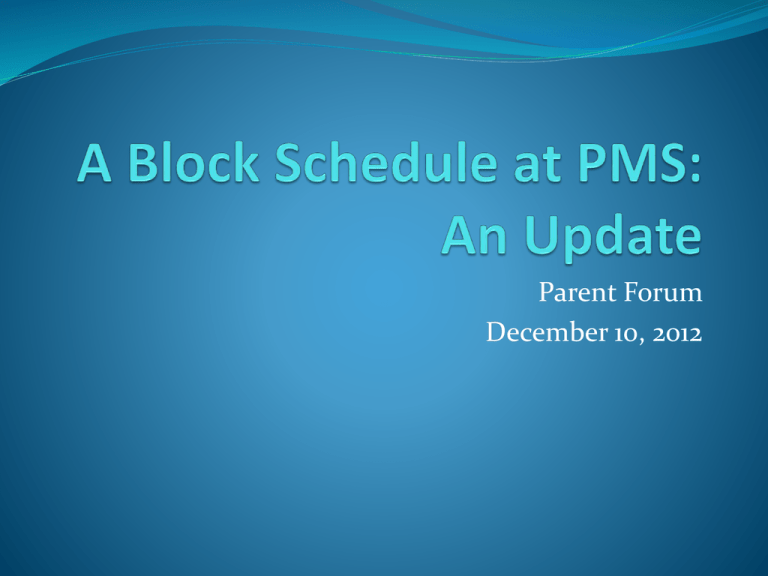Block Presentation-Dec-10-2012
advertisement

Parent Forum December 10, 2012 Jeanne Donovan Welcome We want to make a great program even better As educators, we always ask, “What can we do better?” How can we do more to meet new 21st century core standards with the resources we already have? Would a modified block schedule improve student learning? Agenda Introduce committee of staff & parents Evolution of Thought and Process Proposed, Trialed Modified Block Our Findings, Results of Survey Challenges, Improvements: Why a 3-day Block? 6. Next Steps 7. Panel discussion with Q&A 1. 2. 3. 4. 5. Block Schedule Committee Educators Parents Jeanne Donovan, Principal Eric Mapes, Asst. Principal Hannah Bjork, Spanish Brad Goodson, Math 6 and 8 Ted Greenebaum, Science 8 Jane Hickman, English 8/Journalism Annie Holland, English 8/History 8 Joci Kelleher, Core 6/Study Skills Stella Kennedy, Core 6/Green Team Kim Lipkin, Art/Leadership Gina McKuen, Core 7/Shakespeare Carrie Poole, Special Education Amy Savage, Special Education Anne Smith, Film/Animation Camilla Thayer, Science 6 & 7 Jon Elliott Katie Korotzer Sue Lin Shirley Rexrode, PMS PC Pres. Esther Rogers Lillis Stern Gautam Wadhwani, PMS PC Tsr. Former Member: Mary Kelly, Past PMS PC President Evolution of Thought Wanted to consider block schedule Researched options Conducted a 2-day block trial (90-minute periods) for two weeks this fall Surveyed stakeholders Discussed benefits and challenges Changed proposal to 3-day block to address challenges while maintaining benefits An Enriching, Collaborative Process 2010 Staff inquiry began April 2011 First presentation at Parents’ Club meeting Oct. 2011 First parent forum Oct. 2011 Parents joined Block Schedule committee 2011-2012 Site visits, readings, discussions April 2012 Second parent forum (included elementary) Oct. 2012 Two week trial of 2-day modified Block Oct. 2012 Student, parent and staff surveys Nov. 2012 Analysis of results which led to proposed 3-day Block Dec. 2012 Third parent forum (includes elementary) “Traditional” vs. “Modified Block” Schedule Traditional 7-period day: each class meets every day Modified Block Each class meets four times per week Blocked periods – four or five classes per day Trialed 2-day Block Schedule • 2 traditional and 3 blocked days • Early dismissal at 2:05 pm every week on Wednesday Why Change: Improved Learning We expected to find that longer periods: Allow for better, deeper grasp of concepts Create uninterrupted time for research Provide opportunities for richer discussions Reduce passing time & set-up/clean-up time Lend themselves more effectively to multiple activities What We Learned Deeper grasp of concepts Example: Math (Mr. Goodson) Uninterrupted research or writing time Example: Core 6 (Mrs. Kelleher) Richer discussions and elaborate activities Example: History 8 (Mrs. Holland) Reduced transition time = time for debriefing Example: Science (Mr. Greenebaum) Multiple activities Examples: Core 7 (Ms. Brenneman), World Languages (Mrs. Bjork) and P.E. (Mrs. Jarvis) Survey Results: Faculty Majority of the faculty agreed or strongly agreed that during the block schedule trial: They could utilize a greater variety of teaching strategies They could better address the range of learning styles They had increased individualized student interaction Pacing was challenging in a 90-minute period Survey Results: Students 72% of students indicated that blocked periods during the trial increased: Interaction time with teachers Ability to learn Comprehension of lessons Homework due less frequently, reduced student stress Survey Results: Parents’ Perspectives About Block Trial Majority felt somewhat or very positive overall Majority supported schedule with two or more block days Over 75% of students spoke with their parents about their experience Addressing the Challenges Trialed 2-day Block Schedule Addressing the Challenges Challenge With 2-Day 90-minutes challenging for some classes One heavy day, one light 6th Grade P.E.& Music – who gets 90-minute block? Catching up after absence Lunch B too late Not seeing students daily Proposed 3-Day Block Schedule • 2 traditional and 3 blocked days • Early dismissal at 1:48 pm every week on Wednesday (same as elementary schools) Addressing the Challenges Challenge With 2-Day How 3-Day Addresses It 90-minutes challenging for some classes 72-minutes preferable One heavy day, one light More balanced 6th Grade P.E.& Music – who gets 90-minute block? Each gets a 72-minute block Catching up after absence Less curriculum missed Lunch B too late All have lunch at noon Not seeing students daily No change Looking Ahead Conduct teacher vote on final proposal: Principal & Superintendent must approve Majority of teachers must approve School Board must approve Earliest possible implementation 2013-2014 If approved, staff development and planning time provided between January and June 2013 – curriculum, organizing one lunch, master schedule If implemented, all stakeholders will be surveyed next year as we continue to evaluate effectiveness Summary Result of a broad, judicious inquiry process Majority of teachers support opportunity for innovation 72-minute periods preferable to 90 minute periods Still provide great benefits to student learning Community input is valued; please contact: Any parent member on the committee OR PMS_PC.BlockSchedule@comcast.net Appendix Sample Sixth Grade Schedule Comparison 2 – Day Block (90-minute periods) 3 - Day Block (72-minute periods) Tuesday: Language Arts Science Math Reading Tuesday: Language Arts Math Science Elective Wheel Reading Wednesday: Social Studies P.E./Music (45 minutes of each) Elective Wheel Early Release Wednesday: Social Studies Math Science P.E./Music Early Release For 6th graders, this meant that Wednesdays were very light. Thursday: Language Arts Social Studies P.E./Music Elective Wheel Reading Educational Rationale Supports interdisciplinary theme development Provides time for teachers to develop instructional practices that increase differentiation Provides time for teachers to evaluate assessments Supports continued development of professional learning communities, which aligns with new teacher evaluation system







